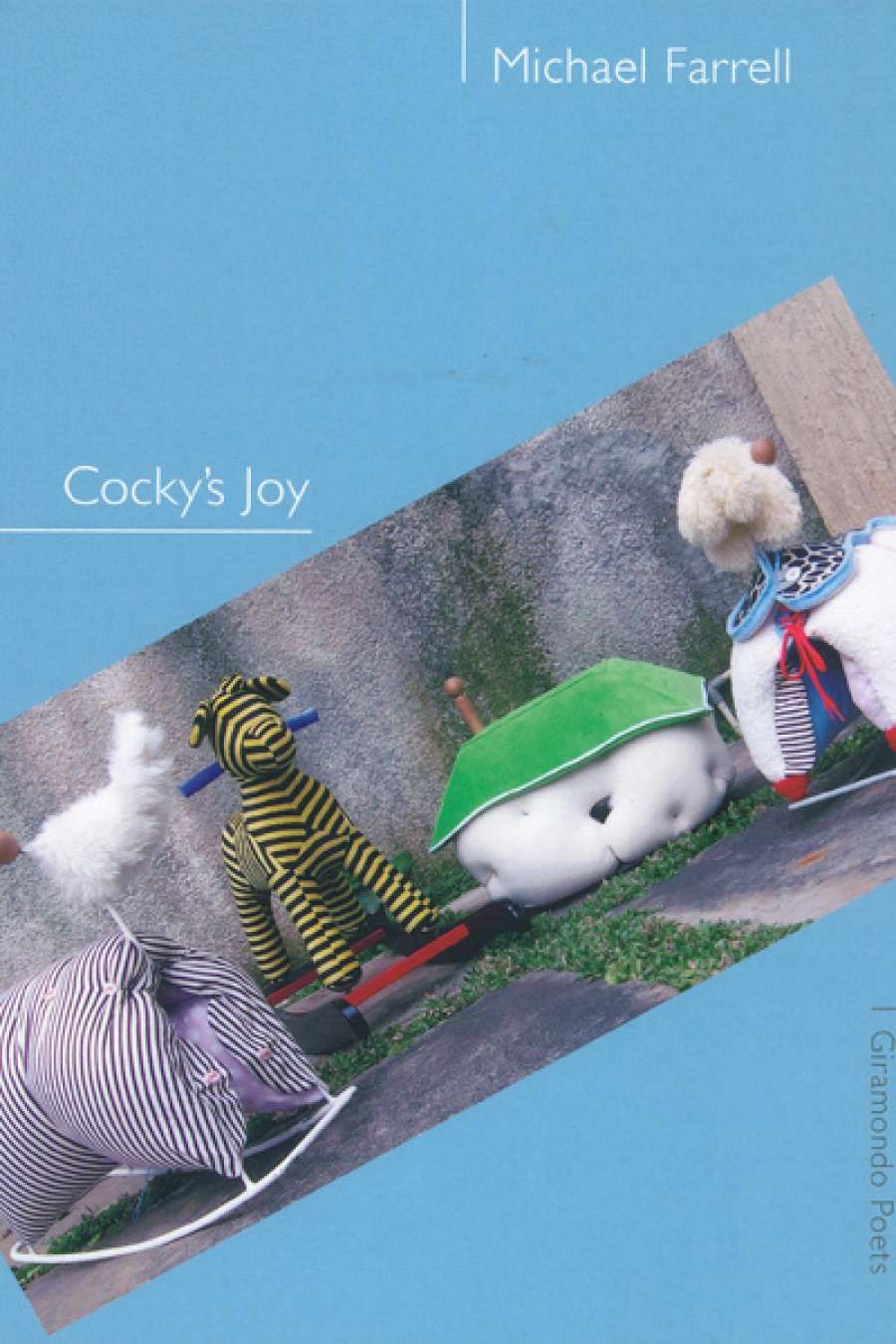
- Free Article: No
- Contents Category: Poetry
- Custom Article Title: David McCooey reviews 'Cocky's Joy' by Michael Farrell
- Review Article: Yes
- Online Only: No
- Book 1 Title: Cocky's Joy
- Book 1 Biblio: Giramondo, $24 pb, 95 pp, 9781922146762
Cocky’s Joy repeatedly shows that the demarcation between politics and poetics is unstable. Farrell critiques contemporary culture just as much as he plays with it. ‘Californian Girls’, for instance, is a hilarious but devastating vision of consumerism and pop culture. The eponymous women are comically and symbolically gigantic, and ‘If you’ve seen Banksy’s documentary, / you’ll have seen all the corporate cleaners being / processed into bleached pubic bushes for these / giants: other immigrant workers jerking off and / bleeding into vats that broadcast banks of attraction / and resistance to the non-Californian world. If / there’s anywhere left that could really be called / that.’
Elsewhere, Farrell is more programmatically ‘political’, such as in ‘Bringing the “A”’, where the ‘A’ can stand for (at least) both Australia and the alphabet, an idea and technology used to dispossess indigenous peoples of their land: ‘The ship came bringing the “A” // The land was read as a space for the “A” // The “A” damaged the land and fed the people / Who brought it // In Aboriginal Australia there was no cattle / No cloven: therefore no “A”’.
‘Comic narratives and surreal imagery seem to pour out of Farrell’
But Farrell’s postmodern deformations of the colonial imaginary (still so present in Australia’s policies regarding asylum seekers and indigenous Australians) illustrate only one aspect of his creative agon with the past. The past is everywhere in Cocky’s Joy. In particular, Farrell’s postmodern experiments with form and style engage the most ‘primitive’ of poetic forms: narrative poetry, catalogue poetry, and sound poetry. ‘Spoiled for Choice: 80 Ganymedes’ is a comic catalogue of attractive men (Ganymede being, according to Homer, the most beautiful of mortals). ‘The Blazon Family’ similarly revises literary history, listing a catalogue of bodily features as per the Petrarchan tradition, but in a way that is both hilariously surreal (especially in its associativeness) and produces something bordering on sound poetry:
THIGHS of Mansfield Park /
Abbey Road / Brighton Rock DVD
thighs of Helen Mirren / George
Harrison / Jane Austen
thighs of sparrow / white mouse / Loch
Ness monster
thighs of Monte Carlos / Scotch
Fingers / Oreos
thighs of Westminster Abbey /
Père Lachaise / Ors cemetery
The drive to abstraction via catalogue is also seen in ‘seating arrangement’, which begins on ‘Table 1’ with ‘eldest child of an eldest child and an eldest child’, a surprisingly musical poem, teetering on that point where repetition makes language uncanny and threatens to empty it of semantic content.
There are still some who like to refer ominously to ‘the postmodernists’ (just as politicians once referred to ‘the communists’). As Farrell shows, inasmuch as they exist, ‘the postmodernists’ are funny, attracted to form, and deeply versed in those competing and random vectors some might call ‘tradition’. Cocky’s Joy is a brilliant book, and poems like ‘Motherlogue’ show what can be done with our national literature if one has Farrell’s fearlessness and originality. If Cocky’s Joy was a CD (if we still had CDs, that is), I would – employing the argot of music journalists – say that it is a jaw-dropping behemoth of an album. It is full of brilliant gags, puns, allusions, disturbing and comic metaphors, surreal images, and linguistic games.
No review can really do such an extraordinary work justice, which is the perfect reason to read it.


Comments powered by CComment